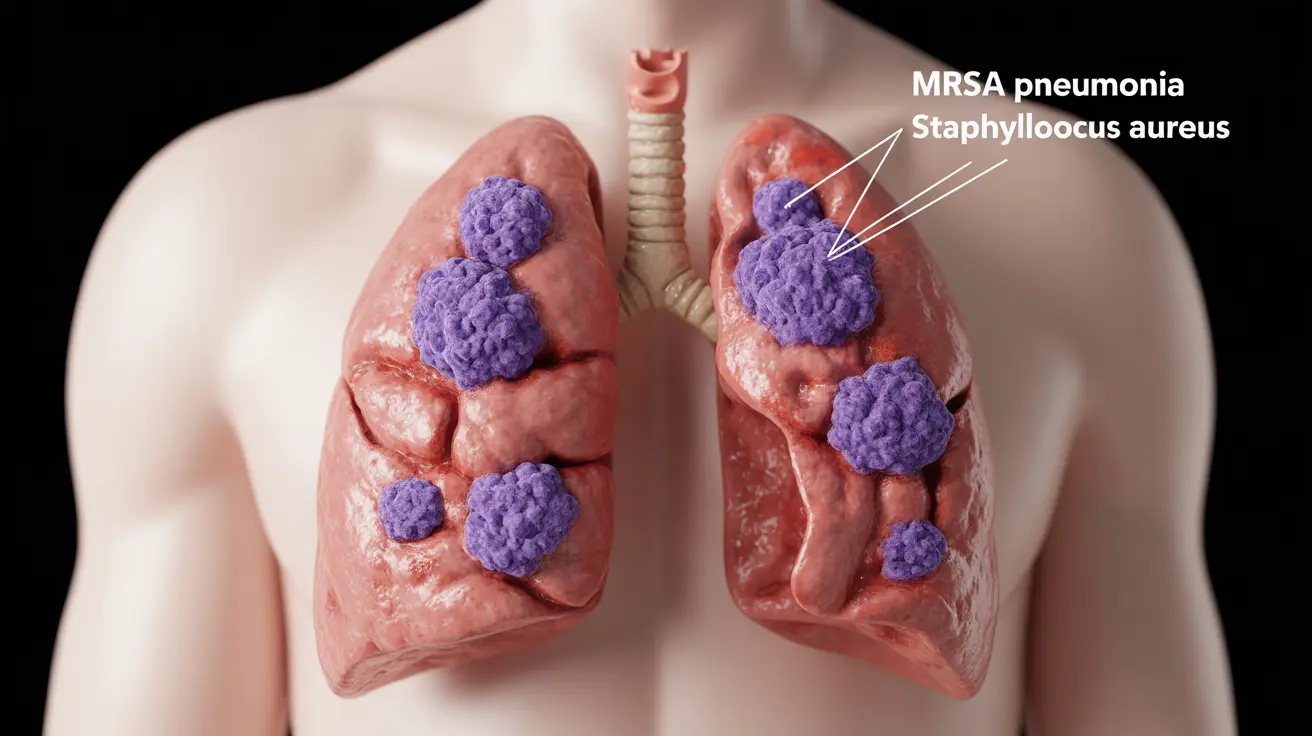MRSA pneumonia is a serious respiratory infection caused by methicillin-resistant Staphylococcus aureus bacteria. This potentially life-threatening condition requires prompt medical attention and specific antibiotic treatment approaches. Understanding its symptoms, risk factors, and prevention strategies is crucial for both healthcare providers and the general public.
Unlike typical pneumonia, MRSA pneumonia can progress rapidly and may be more challenging to treat due to the bacteria's resistance to common antibiotics. This comprehensive guide will help you understand the key aspects of MRSA pneumonia, from initial symptoms to treatment options.
Understanding MRSA Pneumonia
MRSA pneumonia occurs when methicillin-resistant Staphylococcus aureus bacteria infect the lungs, causing inflammation and fluid accumulation in the air sacs. This condition can develop either in healthcare settings (hospital-acquired) or in community settings (community-acquired), with each type presenting unique challenges for treatment and management.
Signs and Symptoms
MRSA pneumonia typically presents with more severe symptoms compared to other types of pneumonia. Common indicators include:
- High fever and chills
- Severe chest pain
- Rapid, difficult breathing
- Productive cough with thick mucus
- Extreme fatigue
- Muscle aches
- Shortness of breath
- Rapid heartbeat
Diagnosis and Testing
Healthcare providers use multiple diagnostic tools to confirm MRSA pneumonia:
- Chest X-rays or CT scans
- Sputum culture tests
- Blood cultures
- Bronchoscopy in severe cases
- Rapid molecular testing for MRSA
Treatment Approaches
Treatment for MRSA pneumonia typically involves:
- Specialized antibiotics effective against resistant bacteria
- Hospitalization for severe cases
- Respiratory support when needed
- Careful monitoring of vital signs
- Supportive care to manage symptoms
Antibiotic Options
Several antibiotics may be used to treat MRSA pneumonia, including:
- Vancomycin
- Linezolid
- Daptomycin
- Ceftaroline
- Combination therapy in severe cases
Risk Factors and Prevention
Certain factors increase the risk of developing MRSA pneumonia:
- Recent hospitalization
- Weakened immune system
- Advanced age
- Chronic health conditions
- Recent antibiotic use
- Close contact with infected individuals
Prevention Strategies
Key prevention measures include:
- Proper hand hygiene
- Contact precautions in healthcare settings
- Regular cleaning and disinfection
- Proper wound care
- Avoiding close contact with infected individuals
- Following prescribed antibiotic regimens completely
Frequently Asked Questions
What are the common symptoms and signs of MRSA pneumonia to watch for?
The most common symptoms include high fever, severe chest pain, difficulty breathing, productive cough with thick mucus, extreme fatigue, and rapid heartbeat. These symptoms often develop more rapidly and severely than with typical pneumonia.
How is MRSA pneumonia diagnosed and what tests are used to confirm it?
Diagnosis typically involves chest imaging (X-rays or CT scans), sputum cultures, blood tests, and sometimes bronchoscopy. Rapid molecular testing can help identify MRSA specifically, allowing for targeted treatment.
What antibiotics are most effective for treating MRSA pneumonia?
The most effective antibiotics include vancomycin, linezolid, daptomycin, and ceftaroline. Treatment choice depends on factors like severity, patient allergies, and local resistance patterns.
How does MRSA pneumonia spread and who is at higher risk of getting it?
MRSA pneumonia spreads through direct contact with infected individuals or contaminated surfaces. Those at higher risk include people with recent hospitalizations, weakened immune systems, chronic health conditions, and those who have recently used antibiotics.
What steps can be taken to prevent MRSA pneumonia, especially in hospital settings?
Prevention focuses on proper hand hygiene, contact precautions, regular cleaning and disinfection, proper wound care, and following infection control protocols. In hospitals, additional measures include patient screening and isolation procedures when necessary.




